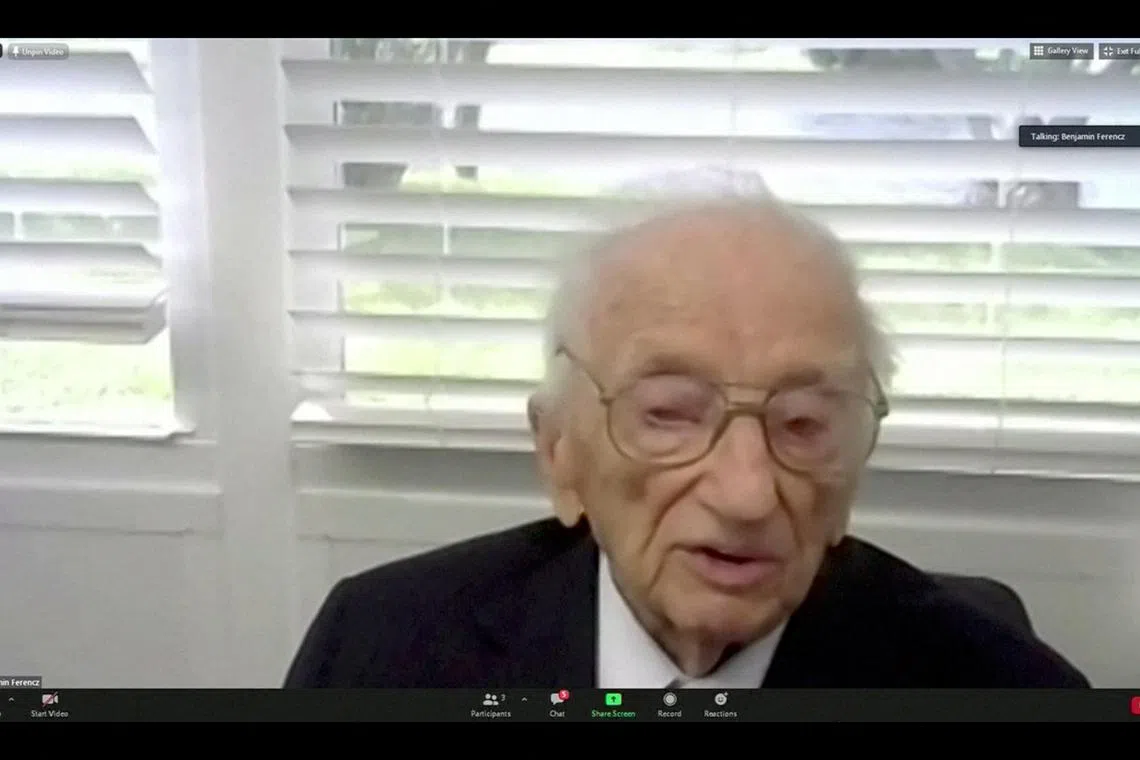Last surviving Nuremberg prosecutor Ben Ferencz dies at 103
Sign up now: Get ST's newsletters delivered to your inbox

A still image from 2020 showing Mr Benjamin Ferencz, a former chief prosecutor in the Nuremberg trials, speaking from his home in the US during a video interview.
PHOTO: REUTERS
NEW YORK – Benjamin Ferencz, the last surviving prosecutor from the Nuremberg trials in Germany that brought Nazi war criminals to justice after World War II and a long-time apostle of international criminal law, died on Friday at 103, NBC News reported, citing his son.
Mr Ferencz, a Harvard-educated lawyer, secured convictions of numerous German officers who led roving death squads during the war.
Circumstances of his death were not immediately disclosed. The New York Times reported that he died at an assisted-living facility in Boynton Beach, Florida.
He was just 27 years old when he served as a prosecutor in 1947 at Nuremberg, where Nazi defendants such as Hermann Goring faced a series of trials for crimes against humanity, including the genocide known as the Holocaust, in which six million Jewish people and millions of others were systematically killed.
Mr Ferencz then advocated for decades for the creation of an international criminal court, a goal realised with the establishment of an international tribunal that sits in The Hague, Netherlands.
He also was a significant donor to the United States Holocaust Memorial Museum established in Washington.
“Today, the world lost a leader in the quest for justice for victims of genocide and related crimes. We mourn the death of Ben Ferencz – the last Nuremberg war crimes prosecutor. At age 27, with no prior trial experience, he secured guilty verdicts against 22 Nazis,” the museum said in a post on Twitter.
At Nuremberg, he became chief prosecutor for the US in the trial of 22 officers who led mobile paramilitary killing squads known as Einsatzgruppen that were part of the notorious Nazi SS, or Schutzstaffel.
The squads carried out mass killings targeting Jews, gypsies and others – primarily civilians – during the war in German-occupied Europe, and were responsible for more than a million deaths.
“It is with sorrow and with hope that we here disclose the deliberate slaughter of more than a million innocent and defenceless men, women, and children,” Mr Ferencz said, in his opening statement at the trial.
“This was the tragic fulfilment of a programme of intolerance and arrogance. Vengeance is not our goal, nor do we seek merely a just retribution. We ask this court to affirm by international penal action man’s right to live in peace and dignity regardless of his race or creed. The case we present is a plea of humanity to law.”
Mr Ferencz told the court the accused officers methodically carried out long-range plans to exterminate ethnic, national, political and religious groups “condemned in the Nazi mind”.
“Genocide – the extermination of whole categories of human beings – was a foremost instrument of the Nazi doctrine,” he said.
The defendants all were convicted and 13 were given death sentences. It was Mr Ferencz’s first career case.
Born on March 11, 1920, in Transylvania, Romania, he was 10 months old when his family moved to the US, where he grew up poor in the New York City area called “Hell’s Kitchen”.
After graduating from Harvard Law School in 1943, he joined the US military and fought in Europe before joining the US Army’s newly formed war crimes section.
He seized documents and other evidence at Nazi death camps such as Buchenwald after their liberation by allied forces, surveying scenes of human misery, including piles of emaciated corpses and the crematoria where untold numbers of bodies were incinerated.
After the war ended in 1945, Mr Ferencz was recruited to join the US prosecution – serving under General Telford Taylor – at the war crimes trials in Nuremberg, a city where the Nazi leadership had held elaborate propaganda rallies before the war.
The trials were controversial at the time, but ended up being hailed as a milestone on the path towards establishing international law and holding war criminals accountable in even-handed trials.
“What was most significant about it was it gave us and it gave me an insight into the mentality of mass murderers,” Mr Ferencz said in a 2018 interview with the American Bar Association.
“They had murdered over a million people, including hundreds of thousands of children in cold blood, and I wanted to understand how it is that educated people – many of them had PhDs or they were generals in the German Army – could not only tolerate but lead and commit such horrible crimes.”
After the Nuremberg trials, Mr Ferencz worked to secure compensation for Holocaust victims and survivors. He later advocated for the creation of an international criminal court. In 1998, 120 countries adopted a statute in Rome to establish the International Criminal Court, which came into force in 2002.
At 91, he took part in the first case before the court by delivering a closing statement in the prosecution of Congolese warlord Thomas Lubanga Dyilo, who was convicted of war crimes.
Over the years, Mr Ferencz was critical of actions by his own country, including during the Vietnam War. In January 2020, he wrote an opinion piece in The New York Times calling the US killing of a senior Iranian military leader in a drone strike an “immoral action” and “a clear violation of national and international law”.
“The reason I have continued to devote most of my life to preventing war is my awareness that the next war will make the last one look like child’s play,” he told the bar association in 2018.
“‘Law, not war’ remains my slogan and my hope.” REUTERS


